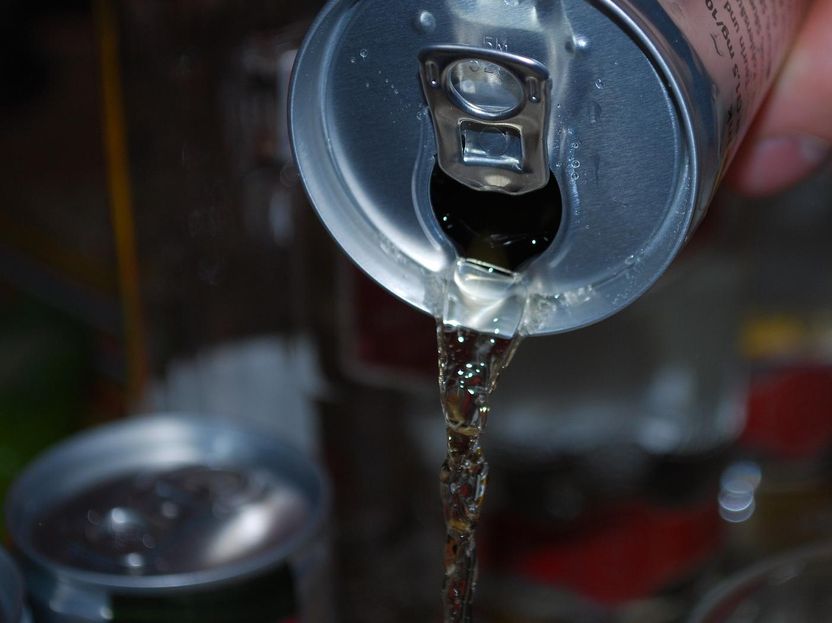Energy drinks: Do they harm children's hearts?
What are the effects of energy drinks on cardiovascular function in young people?
energy drinks are consumed not only by adults, but also by many children and young people - and in some cases several times a day - for example when playing computer games, before sports, during an exam period or when partying with friends. In most cases, young consumers hope to be more alert and more productive. To achieve the desired effects, energy drinks contain not only lots of sugar but also substances such as caffeine, taurine, guarana and glucuronolactone, as well as colorants and flavorings. A can of energy drink (250 ml) contains an average of 80 mg of caffeine. When consumed in excess, energy drinks can adversely affect cardiovascular function, study data suggest. "The feared consequences range from abnormalities in heart rhythm to changes in vascular elasticity and increases in blood pressure," explains cardiologist Prof. Thomas Voigtländer, MD, chairman of the board of the German Heart Foundation. "We therefore want to have the risks posed by the ingredients of energy drinks for the still young hearts and vessels of children and adolescents investigated in more detail in a study." Info on the funding project is available at www.herzstiftung.de/energy-drinks.

Herbich / Pixabay
Increased health risks, which can arise in particular for the cardiovascular system when consuming high quantities of energy drinks, were reported by the Federal Institute for Risk Assessment (BfR), among others, in a statement on energy drinks in 2019. According to the BfR, it cannot be ruled out that a chronically very high intake of caffeine (e.g., more than 1 liter per day of energy drinks), "could also promote the development of cardiovascular diseases in children and adolescents in the long term." Study data are now expected to provide more insight into possible cardiovascular consequences in children and adolescents.
Munich pediatric cardiologists investigate consequences of high consumption
The extent to which cardiac risk is increased, especially in young people, is now being investigated by pediatric cardiologists at the Ludwig Maximilian University Hospital in Munich (LMU) in the EDUCATE study (Energy-Drinks Unexplored Cardiovascular Alterations in Teens and TwEens), which is being funded by the German Heart Foundation with around 69,000 euros. "As part of the study, we would like to investigate for the first time the acute effects of energy drink consumption on the cardiovascular function of healthy children and adolescents," explains study leader Felix Oberhoffer, MD, assistant physician in the Department of Pediatric Cardiology and Pediatric Intensive Care Medicine at LMU Hospital. "In particular, cardiac arrhythmias associated with energy drink consumption can lead to a medical emergency, as study data show. In addition, excessive consumption is associated with increased blood pressure. Therefore, we hypothesize that both acute and chronic excessive consumption increase cardiovascular risk," the study physician said.
A Europe-wide overview by the European Food Safety Authority (EFSA) shows who consumes excessively and how often. According to the EFSA, young people consume energy drinks comparatively most often. And in Germany, according to a study, 6.6 percent of adolescents between the ages of 10-18 were identified as "high consumers" who exceeded the maximum amounts for caffeine (according to the specifications of the European Food Safety Authority).
Acute effects of energy drinks in focus
The children and adolescents between the ages of 10 and 18 participating in the study are examined on two consecutive days in the pediatric cardiology department at the LMU Clinic in Munich/Großhadern. On one of the two days, the subjects consume a defined amount of an energy drink. On the other day, they are asked to consume a defined amount of a sugary comparison drink, without the usual ingredients of an energy drink, within 30 minutes. "To avoid falsification of the study results, the children and adolescents do not initially know on which of the two days the energy drink or the comparison drink was consumed," Dr. Oberhoffer explains the procedure.
Following the consumption of the beverage, the heart and vascular function as well as the cardiac currents of the participating children and adolescents will then be measured at regular intervals. After four hours of monitoring, the test person will also be fitted with a long-term blood pressure monitor and a long-term ECG to check blood pressure and heart flows respectively over a further 24 hours.
Safety of the young subjects is ensured
"In the study, we pay strict attention to the health of the young subjects," Oberhoffer emphasizes. "All measures are taken to minimize possible health risks." For example, participants are screened for the presence of cardiovascular disease before consuming the relevant beverages. In addition, the maximum daily dose of caffeine deemed safe will not be exceeded. If the acute effects of energy drinks on cardiac function are confirmed, this will strengthen the suspicion that excessive consumption endangers the cardiovascular health of children and adolescents. Oberhoffer hopes that the results could also be used to derive preventive measures for the protection of minors in the future.
Additional info - Caffeine in soft drinks: Where does it become questionable?
The legal regulations on energy drinks are in the Fruit Juice and Soft Drinks Ordinance. According to these, energy drinks are a caffeinated soft drink that may contain a maximum of 320 milligrams of caffeine per liter. If the caffeine content exceeds 150 milligrams per liter, drinks must bear the statement: "Increased caffeine content. Not recommended for children and pregnant or nursing women." Maximum levels also apply to other ingredients.
According to an assessment by the European Food Safety Authority (EFSA), the limit up to which caffeine is safe for health is for:
- healthy adults at a single dose of 200 mg (2-3 cups of coffee or 2.5 cans of an energy drink),
- healthy adults at a daily dose of 400 mg (except pregnant women),
- Children and adolescents at 3 milligrams per kilogram of body weight (per day).
Note: This article has been translated using a computer system without human intervention. LUMITOS offers these automatic translations to present a wider range of current news. Since this article has been translated with automatic translation, it is possible that it contains errors in vocabulary, syntax or grammar. The original article in German can be found here.
Other news from the department science
Most read news
More news from our other portals
© 1997-2025 LUMITOS AG, All rights reserved



























































